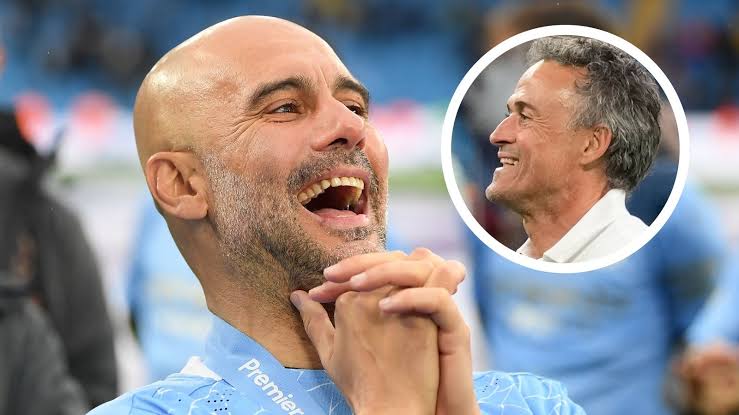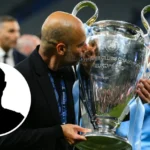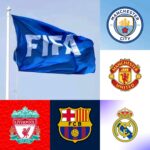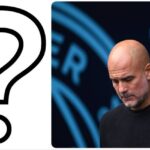The Great Debate: Pep Guardiola’s 2023 Manchester City vs Luis Enrique’s 2025 PSG

In the pantheon of football greatness, few debates ignite as much passion as comparing legendary teams across different eras. Today, football analysts and fans alike find themselves captivated by a particularly compelling comparison: Pep Guardiola’s treble-winning Manchester City side of 2023 versus Luis Enrique’s dominant Paris Saint-Germain team of 2025. Both teams achieved the ultimate prize in club football – the treble – but their paths to glory and styles of play have sparked intense discussion about which represents the superior footballing machine.
The conversation has reached fever pitch following PSG’s extraordinary 4-0 demolition of Real Madrid in the FIFA Club World Cup, a performance that has many declaring Luis Enrique’s side as the finest team in world football. However, ESPN pundit Alejandro Moreno has thrown down the gauntlet, suggesting that Guardiola’s 2023 Manchester City team was superior to the current PSG juggernaut. This bold claim has reignited one of football’s most fascinating debates about greatness, consistency, and the true measure of a legendary team.
Paris Saint-Germain’s transformation under Luis Enrique represents one of the most remarkable turnarounds in modern football history. When the former Barcelona and Spain manager took the reins at the Parc des Princes, few could have predicted the meteoric rise that would follow. What transpired was nothing short of revolutionary – a complete reimagining of PSG’s identity that would see them ascend to heights previously thought impossible for the French giants.
The 2024-25 season will be remembered as the watershed moment for PSG. Their treble triumph was not merely about collecting silverware; it was about doing so with a style and authority that left the football world awestruck. The crowning achievement came in the form of their first-ever Champions League victory, a trophy that had eluded the club despite massive investments and star-studded lineups in previous years. Under Enrique’s guidance, PSG finally conquered Europe, and they did so with a brand of football that was both beautiful and brutally effective.
The Spanish tactician’s influence on the team cannot be overstated. Known for his meticulous attention to detail and ability to maximize player potential, Enrique transformed PSG from a collection of talented individuals into a cohesive, unstoppable force. His tactical acumen was evident in how he managed to blend youth and experience, creating a team that could adapt to any situation while maintaining their core identity.
The current FIFA Club World Cup campaign has only reinforced PSG’s credentials as the world’s premier team. Their emphatic 4-0 victory over Real Madrid was not just a win; it was a statement of intent that reverberated throughout the football world. The performance showcased everything that makes this PSG team special – their pressing intensity, their clinical finishing, their tactical discipline, and their ability to raise their game against the highest level of opposition.
To understand the magnitude of the comparison, one must first appreciate the sheer brilliance of Manchester City’s 2023 treble-winning campaign. Pep Guardiola’s team didn’t just win the treble; they did so while playing some of the most mesmerizing football ever witnessed in the English game. The Citizens’ journey to glory was marked by tactical innovation, individual brilliance, and collective harmony that seemed almost supernatural at times.
The 2023 Manchester City team was the culmination of Guardiola’s six-year project at the Etihad Stadium. Every signing, every tactical tweak, every training session had been building toward this moment of perfect synchronization. The team possessed an almost telepathic understanding of each other’s movements, creating a style of play that was both aesthetically pleasing and devastatingly effective.
Their Premier League triumph was a masterclass in consistency and quality. City’s ability to maintain their exceptionally high standards throughout a grueling 38-game season demonstrated a level of mental fortitude and tactical discipline that separated them from their competitors. They didn’t just win the league; they did so while playing football that will be studied and admired for generations to come.
The FA Cup victory showed their versatility and ability to adapt to different scenarios. Whether facing lower-league opposition or Premier League rivals, City approached each match with the same level of professionalism and tactical awareness. Their cup run was characterized by dominant performances that showcased the depth and quality of Guardiola’s squad.
However, it was their Champions League triumph that truly cemented their legacy. The path to the final was fraught with challenges, including memorable encounters against some of Europe’s elite clubs. Each knockout round presented different tactical puzzles, and City’s ability to solve them demonstrated the tactical genius of Guardiola and the exceptional quality of his players.
The comparison between these two great teams extends beyond mere results and statistics; it delves into the fundamental philosophies that drive their success. Guardiola’s Manchester City represented the pinnacle of possession-based football, a system built on patience, precision, and positional play. Every pass had a purpose, every movement was calculated, and every attack was constructed with architectural precision.
City’s approach in 2023 was characterized by their ability to control games through possession while maintaining the pace and intensity necessary to break down even the most stubborn defenses. Their midfield trio would often dominate the ball, creating a platform for their wide players and strikers to exploit spaces with surgical precision. The team’s ability to switch between different tempos and styles within a single match made them incredibly difficult to prepare for and even harder to contain.
Luis Enrique’s PSG, by contrast, has developed a more direct and dynamic approach that combines the best elements of modern football tactics. While still maintaining significant possession, PSG under Enrique has shown a willingness to be more aggressive in their pressing and more direct in their attacking play. This evolution has made them less predictable and more explosive in their offensive output.
The French side’s tactical flexibility has been one of their greatest strengths. Enrique has successfully implemented a system that allows his players to interchange positions fluidly, creating constant numerical advantages in different areas of the pitch. This positional freedom has unleashed the creative potential of PSG’s attacking players while maintaining the defensive solidity necessary to compete at the highest level.
One of the most fascinating aspects of this comparison lies in how both teams have managed to balance individual brilliance with collective harmony. Manchester City’s 2023 squad was blessed with world-class talent in every position, but it was Guardiola’s ability to mold these stars into a cohesive unit that made them truly special.
The Citizens’ success was built on players who were willing to sacrifice individual glory for collective success. Stars like Kevin De Bruyne, Bernardo Silva, and Riyad Mahrez consistently made decisions that benefited the team rather than enhancing their personal statistics. This selfless approach created a team dynamic where every player understood their role and executed it to perfection.
PSG’s 2025 team has achieved a similar balance, but through a different route. Enrique’s management has been crucial in creating an environment where individual talents can flourish while serving the greater good of the team. The Spanish coach has successfully navigated the egos and expectations that come with managing a star-studded squad, creating a culture where excellence is expected and delivered consistently.
The development of young talents alongside established stars has been particularly impressive at PSG. Enrique’s ability to integrate emerging players into his system while maintaining the team’s competitive edge has added another dimension to their play. This blend of youth and experience has created a dynamic that keeps opponents guessing and provides multiple tactical options in different situations
Both teams have had to navigate the intense pressure that comes with being considered among the world’s best. Manchester City’s 2023 campaign was conducted under the microscope of expectation, with every match analyzed and every decision scrutinized. The pressure of delivering on their potential while maintaining their high standards was immense, yet they thrived under this scrutiny.
The mental fortitude displayed by City throughout their treble-winning season was remarkable. In crucial moments, when the pressure was at its highest, the team found ways to deliver performances that matched the magnitude of the occasion. Their ability to handle pressure situations became one of their defining characteristics, setting them apart from teams that crumbled under similar circumstances.
PSG’s journey has been similarly challenging, with the added pressure of finally delivering the Champions League trophy that the club and its supporters had craved for so long. The expectations placed on Enrique’s team were enormous, yet they have managed to exceed them at every turn. Their ability to perform in high-stakes situations has been one of the hallmarks of their success.
The French giants’ handling of pressure has been particularly evident in their Champions League campaign and their current Club World Cup run. In moments when the stakes were highest, PSG have delivered their best performances, suggesting a mental resilience that matches their tactical sophistication
When examining the statistical output of both teams, the comparison becomes even more intriguing. Manchester City’s 2023 campaign produced numbers that were staggering in their consistency and quality. With 28 wins, 5 draws, and 5 losses across all competitions, they maintained a win percentage of 74% while scoring 94 goals and conceding just 33. Their domestic league performance was particularly impressive, accumulating 89 points in what was a highly competitive Premier League season.
PSG’s 2025 numbers tell a story of slight improvement in certain areas while maintaining similar levels of excellence overall. With 26 wins, 6 draws, and 2 losses, they achieved a marginally better win percentage of 76%. Their goal-scoring output of 92 goals was comparable to City’s, while their defensive record of 35 goals conceded was remarkably similar. In Ligue 1, they accumulated 84 points, though this must be viewed in the context of the different competitive standards between the French and English leagues.
These statistics reveal teams that were remarkably similar in their output, with marginal differences that could be attributed to various factors including opposition strength, fixture congestion, and tactical approaches. The numbers suggest that both teams operated at a level of excellence that few others have achieved in modern football.
Perhaps the most compelling argument in Alejandro Moreno’s analysis concerns the duration of excellence demonstrated by each team. His observation that Manchester City’s brilliance was sustained over a longer period raises important questions about how we evaluate greatness in football. City’s 2023 campaign was the culmination of several years of building and development, with their peak performance level maintained throughout an entire season.
The argument for sustained excellence is compelling. City’s ability to maintain their incredibly high standards from the first match of the season to the Champions League final demonstrated a level of consistency that is rare in modern football. Their performance didn’t fluctuate dramatically; instead, they operated at a consistently elite level that wore down opponents and inspired confidence in their own abilities.
PSG’s rise, while spectacular, has been more concentrated in terms of timeframe. Their transformation under Enrique has been rapid and dramatic, but the sample size is smaller when compared to City’s sustained excellence. This raises questions about whether PSG’s current level can be maintained over a longer period, or whether their peak represents a shorter burst of exceptional performance.
However, the counterargument is that PSG’s peak might be higher than City’s sustained excellence. The French side’s recent performances, particularly their dismantling of Real Madrid, suggest a level of dominance that might exceed even City’s best displays. The challenge for PSG will be maintaining this level over a longer period, something that City proved capable of doing throughout their treble-winning campaign.
The competitive context in which these achievements occurred cannot be ignored when making comparisons. Manchester City’s 2023 treble was achieved in arguably the most competitive club football environment in the world. The Premier League’s strength in depth, combined with the quality of opposition in the Champions League, provided a rigorous test of City’s credentials throughout the season.
City’s domestic competition included teams like Arsenal, Manchester United, Newcastle United, and Liverpool, all of whom presented significant challenges. The depth of quality in the Premier League meant that every match required maximum effort and tactical precision. This competitive environment forged a team that was battle-tested and resilient, qualities that served them well in the crucial moments of their treble campaign.
PSG’s dominance has occurred within a different competitive framework. While Ligue 1 has continued to improve, it still lacks the overall depth and quality of the Premier League. This doesn’t diminish PSG’s achievements, but it does provide context for their domestic success. However, their Champions League triumph and current Club World Cup performances have come against the highest level of international opposition, demonstrating that their quality transcends domestic competition.
The Champions League provides the most direct comparison between the two teams, as both had to navigate the same competition format against similar levels of opposition. City’s path to glory involved several memorable encounters against top-tier European clubs, while PSG’s journey was marked by dominant performances that culminated in their emphatic final victory.
Beyond statistics and trophies lies the subjective realm of aesthetic appeal and playing style. Manchester City’s 2023 team played football that was often described as poetry in motion. Their ability to maintain possession while creating chances seemed effortless, with players moving in perfect synchronization to create space and opportunities.
City’s style was characterized by its fluidity and unpredictability within a structured framework. Players would interchange positions seamlessly, creating overloads in different areas of the pitch while maintaining their defensive shape. This approach produced moments of breathtaking beauty that captured the imagination of football fans worldwide.
PSG’s style under Enrique has been more explosive and direct, though no less impressive. Their ability to transition from defense to attack with lightning speed has created some of the most memorable moments in recent football history. The team’s attacking play has been characterized by its intensity and clinical finishing, producing highlight-reel moments that showcase the individual brilliance within their collective framework.
The aesthetic debate is largely subjective, with some preferring City’s methodical approach and others favoring PSG’s more dynamic style. Both teams have demonstrated that there are multiple paths to excellence, each with its own appeal and effectiveness.
The question of legacy looms large in this comparison. Manchester City’s 2023 treble represented the culmination of Guardiola’s project and established them as one of the greatest teams in English football history. Their achievement was built on years of development and represented a sustained period of excellence that few teams have matched. City’s legacy is secure, with their 2023 campaign serving as a template for how modern football can be played at the highest level. Their influence on tactical development and player development has been profound, with many teams attempting to replicate their success through similar approaches.
PSG’s legacy is still being written, but their recent achievements have already secured their place in football history. Their first Champions League triumph was a watershed moment for French football, while their current dominance suggests that their influence will continue to grow. The question remains whether they can maintain their current level and build upon their early success.
The comparison between Manchester City’s 2023 team and PSG’s 2025 side ultimately reveals that greatness can be defined in multiple ways. City’s sustained excellence over a longer period demonstrates one form of greatness, while PSG’s peak performance level showcases another. Both teams have achieved remarkable things, but in different ways and under different circumstances.
Moreno’s argument for City’s superiority based on longevity is compelling, as it speaks to the difficulty of maintaining elite performance over extended periods. However, PSG’s recent performances suggest a level of dominance that might exceed City’s peak moments. The truth is that both teams represent different aspects of footballing excellence, making direct comparison both fascinating and ultimately subjective. The debate will continue as PSG attempts to maintain their current level and build upon their early success. If they can sustain their excellence over a longer period, they may eventually surpass City’s achievements. However, City’s 2023 campaign remains a benchmark for sustained excellence that few teams have matched.
In the end, the comparison between these two exceptional teams serves to highlight the beauty and complexity of football. Both Manchester City’s 2023 side and PSG’s 2025 team have contributed to the rich tapestry of football history, each in their own unique way. Whether one believes City’s sustained excellence trumps PSG’s peak performance, or vice versa, both teams deserve recognition as among the greatest in football history.
The debate itself is a testament to the quality of both teams and the passionate engagement of football fans worldwide. As PSG continues their journey and attempts to build upon their early success, the comparison will evolve and develop. What remains constant is the appreciation for the exceptional quality demonstrated by both teams and the inspiration they provide for future generations of footballers and fans.
Football’s greatest beauty lies not in declaring definitive winners in these debates, but in celebrating the different forms of excellence that make the sport so compelling. Both teams have contributed to that excellence, creating memories and moments that will be treasured long after the final whistle has blown on their respective eras of dominance.















